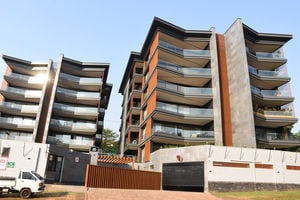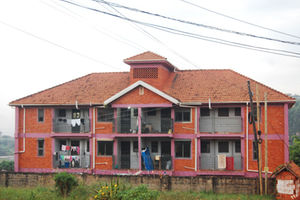
Some tenants and landlords subject each other to difficult experiences. PHOTOs/unsplash.com.
From the bustling streets of Kampala to the serene landscapes of the countryside, the vibrant real estate market is not without its twists. The interactions between tenants and landlords have produced truly odd stories. These tales, recounted by those who have lived them, offer a glimpse into the strange side of renting properties.
The tenants’ accounts
Incomplete rentals
After three months of house hunting, Elizabeth Kabami, a tenant in Mpererwe, a city suburb found a single-room rental that she liked especially because it was near her workplace which meant she would save on her transport costs. One disadvantage, however, was that most of the basic amenities such as functioning toilets and running water were unfinished. When she paid four months’ rent, her landlord agreed that he would add the missing essentials to the house in the first week of her stay. She was shocked when she realised her landlord had made it a habit that every time she reminded him to complete the missing essentials in the rental, he extended the works to a later date.
“Three months later, nothing had been done. Despite paying rent in advance, I was left with an uninhabitable space and had to find alternative accommodation,” Kabami shares.
In a quiet neighbourhood in Entebbe, Alex Tugume found an ideal house that had all the amenities that he looked for in a rental. Up to today, he does not understand what was wrong; he experienced a chilling encounter during his first month as he settled in.
“I moved into a two-bedroom apartment, only to realise there were weird noises and sudden chills that often came in the night. The landlord failed to mention the apartment’s haunted history. It was not until neighbours shared with me stories that I understood that many of the tenants who came in before moved out after a short while because of the same problem,” he explains.
Despite having paid three months’ rent, Tugume left the rental for the sake of his peace of mind. He has since taken it seriously to first do research on the history of rentals and their neighbourhoods before deciding to move in a new rental.
Loud music and nightlife
Rentals near busy streets or nightlife areas often come with their own set of challenges. For tenants such as Sandra Mawagi in Kyanja, the noise from nearby bars and clubs was unbearable.
“Every night, loud music would blare from the nearby clubs until the early morning. It was impossible to get a good night’s sleep. Despite multiple complaints, the landlord insisted there was nothing he could do about it. I had to move out eventually,” Mawagi recalls.
In the same locality, landlord Ahmed Byaruhanga rented his house to what he thought was a quiet family. However, the tenants turned out to be avid party-animals.
“Every weekend, they would host loud parties that went on until the early hours,” Byaruhanga recalls.
“The noise was unbearable, and the neighbours constantly complained. It got to a point where I had to evict them to restore peace to the neighbourhood,” he adds.
In other cases, landlords live on the same property as their tenants, which can lead to awkward encounters and conflicts over privacy. Agnes Mulungi, a renter, recounts multiple scenarios when her landlord knocked on her door at midnight without notice under the guise of rent collection.
“One night he came when he was drunk with a full glass of alcohol in his hands asking whether I had paid my rent in full. I had paid my rent and an early payment of two months and so I was frustrated because this was not the first time. When I pointed out the inappropriateness of the situation, he told me that it was his property and he could go anywhere he pleased,” says Mulungi. Eventually, she had no option but to leave the rental after the three months she had paid for elapsed.
Mulungi also realised that her landlord had installed surveillance cameras all over the house.
“Although he claimed they were there for my security, they felt like a big invasion of privacy,” says Mulungi.
There were cameras in the hallways, living room, and even outside her bedroom window. She covered them up just to feel comfortable.
Turned my property into a zoo
Joseph Ariho, a landlord in Bukoto, recounts an unusual modification to his property.
“One of my tenants was a traditional healer. Without permission, he converted the living room into a shrine, complete with animal skins and calabashes. It was quite a sight. When he moved out, it took considerable effort and expense to restore the house to its original state.”
Similarly, Sarah Kabera, who owns a property in Kabalagala, faced an unexpected alteration in her rentals.
“A tenant asked if he could keep pets. I agreed, assuming he meant a dog or a cat. A month later, my compound looked like a zoo; there were rabbits, parrots, and even a monkey. The noise and smell were unbearable. I had to evict him and implement a strict no-pets policy,» Kabera recounts.
The DIY tenant
In Ndazabazadde, a village located in Wakiso District, landlord Peter Kimuli encountered an industrious tenant.
“My tenant decided to dig a well in the backyard without informing me. He claimed it was for irrigation purposes, but the well was dangerously deep and poorly constructed. It posed a serious safety hazard. After a heated discussion, I had to hire professionals to fill it in and ensure the ground was safe again,” Kimuli says.
Kimuli was later surprised by his other tenant’s DIY skills.
“When I visited the property for a routine inspection, I found that my tenant had taken it upon himself to renovate the kitchen. While his intentions were good, the work was poor and not up to safety standards. We had to negotiate a plan to professionally redo the renovations without causing too much disruption,” he says.
Unauthorised subletting
Subletting is a common issue, with tenants renting out rooms or even entire sections of a property without landlords’ consent. This can lead to overcrowding, increased wear and tear on the property, and potential legal issues. “I have had cases where tenants rent out to multiple people, turning a single-family home into a crowded boarding house,» says landlord Brian Kalembe from Kampala.
Rent paid in kind
In rural areas, it is not unusual for tenants to offer goods or services instead of cash for rent. This barter system, while rooted in tradition, can lead to complications. For instance, a tenant might offer livestock or farm produce, which may not always equate to the agreed rental value. Betty Namuyimba, a landlady from Wakiso shares, “One tenant offered to pay rent with bags of maize. While it was a nice gesture, it was not practical for my financial needs.”
Defaulters
Some tenants take advantage of landlords’ tolerance. Landlord Patrick Kiggundu from Ntinda shares, “I had a tenant who fell behind on rent. Out of goodwill, I allowed him to stay and promised to pay in installments. One day, he just vanished, leaving behind unpaid bills and a mess. Tracking him down proved impossible, and I had to cover the costs myself.”
Likewise, Miriam Nansubuga who owns rentals in Kasangati faced a puzzling situation when one of her tenants disappeared overnight, leaving behind a fully furnished apartment.
“I went to collect rent, but the tenant was nowhere to be found,” Nansubuga recounts.
“His clothes, furniture, and personal items were all left behind. It was like he vanished into thin air. I reported it to the authorities, but to this day, I have no idea what happened to him.”
The mysterious disappearances
Landlord Agnes Namubiru, who owns several rental properties in Gayaza, experienced a baffling series of events involving disappearing household items. “Every few weeks, tenants would report missing items; utensils, small electronics, even clothes,” Namubiru says. “At first, I thought it was a case of petty theft, but there were no signs of forced entry. It turned out that a previous tenant had made a duplicate key and was sneaking in to take things. It was a huge relief when we finally caught the culprit.”
Legal and financial implications
Handling these oddities has legal and monetary implications according to Joseph Muwonge, a financial advisor specialising in real estate in Kampala. Unforeseen modifications or damages can lead to significant repair costs, which are often not covered by security deposits. Landlords should ensure they have adequate insurance and clear lease terms to mitigate these risks.
“It is crucial for both landlords and tenants to know their rights and obligations under Ugandan law. Unauthorised alterations or activities can lead to legal disputes, which can be costly and time-consuming for both parties,» Muwonge adds.
Property manager John Kityo emphasises the importance of detailed tenancy agreements. “Many of these issues arise from vague or non-existent tenancy agreements. Both parties should clearly outline expectations and restrictions to avoid such unusual scenarios.”
He adds that “Landlords should conduct periodic inspections to ensure their property is maintained properly. This helps in knowing about any unauthorised changes or potential problems early.”
A cultural perspective
Cultural nuances play a significant role in our renting experiences. Kityo explains, “In Uganda, there is a strong cultural component to property and land. Traditional beliefs and practices often intersect with modern rental agreements, leading to some of these unusual situations. Prior understanding and respecting these cultural elements is crucial for harmonious landlord-tenant relationships.”
Certain cultural practices may lead to peculiar situations. For example, tenants to perform traditional rituals on the property, which might include animal sacrifices or other ceremonies.
Tips for avoiding nasty experiences
Kityo says it is possible to have a seamless and enjoyable tenant experience. He suggests the following strategies:
Clear communication: Both parties should communicate their expectations and any specific requirements before signing the lease.
Detailed agreements: Lease agreements should be thorough, covering potential issues like unauthorised alterations, subletting, and maintenance responsibilities.
Regular inspections: Periodic property inspections help catch issues early and ensure the property is being maintained as agreed.
Cultural sensitivity: Understanding and respecting cultural practices can help prevent misunderstandings and conflicts.
Legal awareness: Tenants and landlords should know their legal rights and obligations to avoid potential disputes.
As the real estate market grows, embracing these principles can help ensure that the relationship between tenants and landlords remains as harmonious as possible, despite the occasional oddity.




